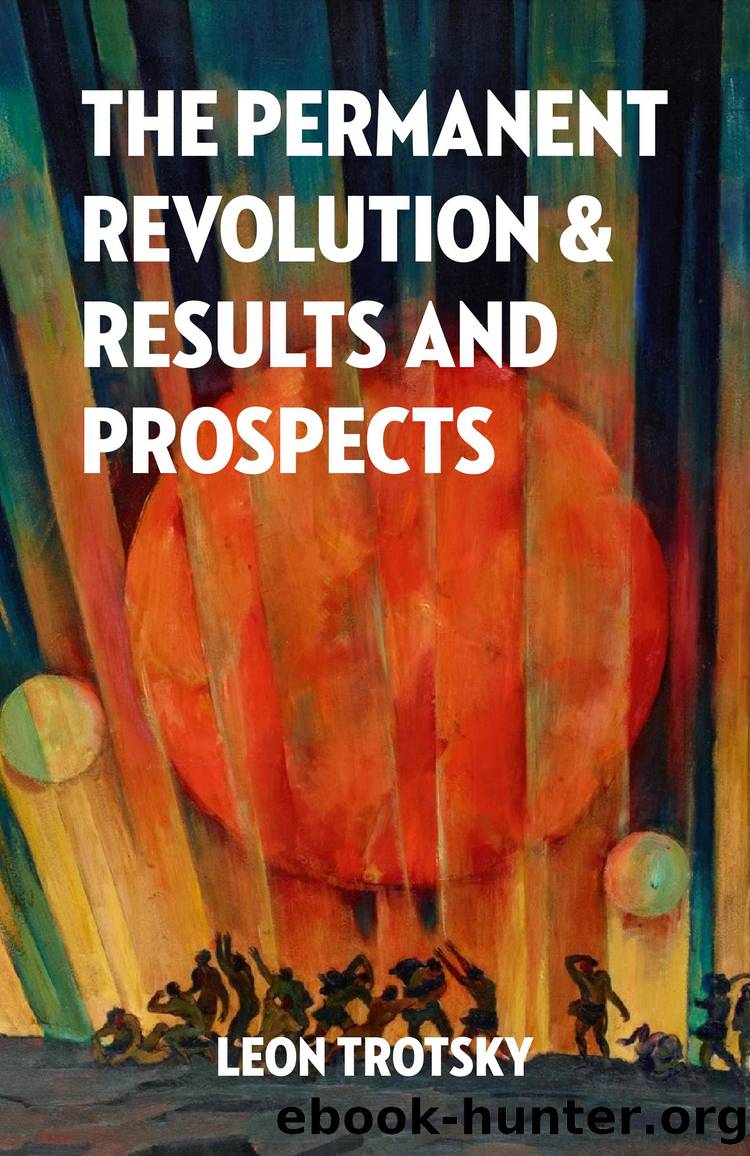The Permanent Revolution & Results and Prospects by Leon Trotsky

Author:Leon Trotsky
Language: eng
Format: epub
Tags: History : Revolutionary
Publisher: Wellred
Published: 2020-09-25T11:48:23+00:00
Yes, âfor the simple reasonâ. What, when the proletariat, together with the peasantry, directs its fight against one class, the bourgeoisie â not against the remnants of feudalism, but against the bourgeoisie â what, if you please, is such a revolution called? Perhaps a democratic revolution? Just notice that Radek said this not in 1905, and not even in 1909, but in March 1927. How is this to be understood? Very simply. In March 1927, Radek also deviated from the right road, only in another direction. In its theses on the Chinese question, the Opposition inserted a most important correction to Radekâs one-sidedness of that time. But in the words just quoted there was nevertheless a kernel of truth: there is almost no estate of landlords in China, the landowners are much more intimately bound up with the capitalists than in tsarist Russia, and the specific weight of the agrarian question in China is therefore much lighter than in tsarist Russia; but on the other hand, the question of national liberation bulks very large. Accordingly, the capacity of the Chinese peasantry for independent revolutionary political struggle for the democratic renovation of the country certainly cannot be greater than was the Russian peasantryâs. This found its expression, among other things, in the bet that neither before 1925 nor during the three years of the revolution in China, did a Narodnik (Populist) party arise, inscribing the agrarian revolution upon its banner. All this taken together demonstrates that for China, which has already left behind it the experience of 1925-27, the formula of the democratic dictatorship presents a much more dangerous reactionary snare than in Russia after the February Revolution.
Still another excursion by Radek, into an even further distant past, turns just as mercilessly against him. This time, it is the matter of the slogan of the permanent revolution which Marx raised in 1850:
With Marx there was no slogan of a democratic dictatorship, while with Lenin, from 1905 to 1917, it was the political axis, and formed a component part of his conception of the revolution in all [? !] countries of incipient [?] capitalist development.
Download
This site does not store any files on its server. We only index and link to content provided by other sites. Please contact the content providers to delete copyright contents if any and email us, we'll remove relevant links or contents immediately.
| Africa | Americas |
| Arctic & Antarctica | Asia |
| Australia & Oceania | Europe |
| Middle East | Russia |
| United States | World |
| Ancient Civilizations | Military |
| Historical Study & Educational Resources |
Red Famine: Stalin's War on Ukraine by Anne Applebaum(2468)
Chernobyl by Serhii Plokhy(2131)
Midnight in Chernobyl by Adam Higginbotham(2081)
The House of Government by Slezkine Yuri(1846)
Midnight in Chernobyl: The Untold Story of the World's Greatest Nuclear Disaster by Adam Higginbotham(1776)
Red Shambhala by Andrei Znamenski(1752)
The Gulag Archipelago (Vintage Classics) by Aleksandr Solzhenitsyn(1730)
From Cold War to Hot Peace by Michael McFaul(1714)
All the Kremlin's Men by Mikhail Zygar(1700)
Putin's Labyrinth(1661)
Red Notice by Bill Browder(1595)
The Future Is History by Masha Gessen(1592)
From Russia with Lunch by David Smiedt(1552)
A People's Tragedy by Orlando Figes(1545)
The Romanovs by Simon Sebag Montefiore(1490)
How to Tame a Fox (and Build a Dog): Visionary Scientists and a Siberian Tale of Jump-Started Evolution by Lee Alan Dugatkin & Lyudmila Trut(1469)
Putin's Labyrinth: Spies, Murder, and the Dark Heart of the New Russia(1457)
The Lost Spy by Andrew Meier(1399)
Art and Revolution by John Berger(1391)
